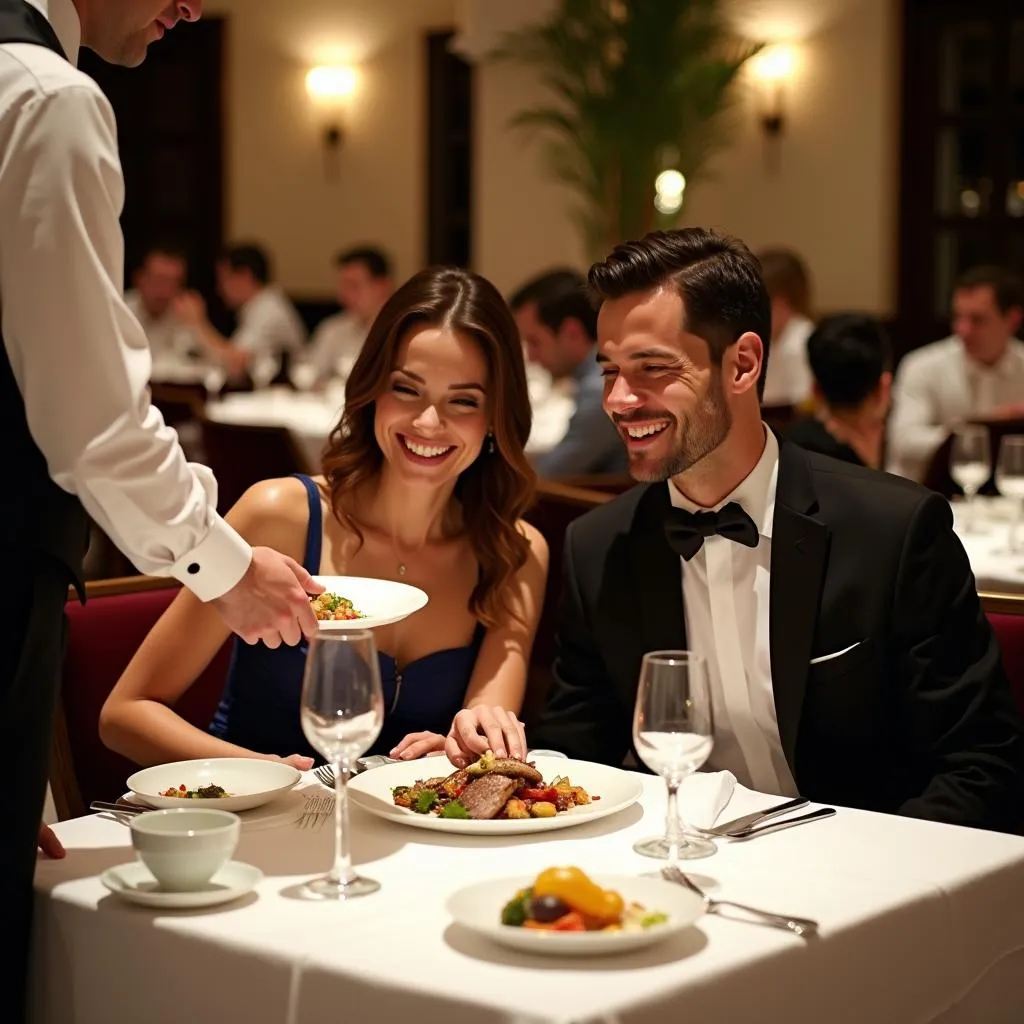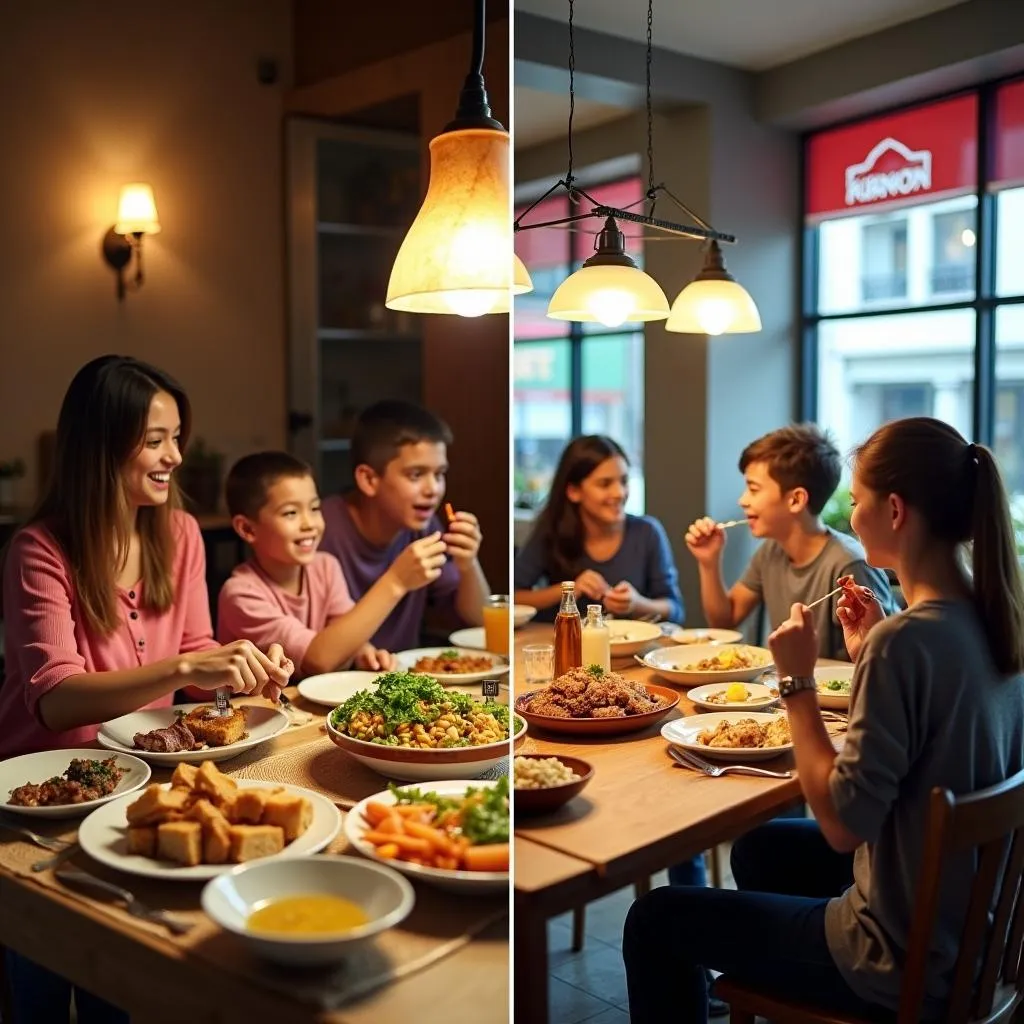The topic of describing a recent enjoyable meal is a common one in IELTS Speaking tests. It allows examiners to assess candidates’ ability to discuss personal experiences, use descriptive language, and express opinions. This topic has appeared frequently in past exams and is likely to continue being a popular choice due to its universality and relevance to everyday life.
Nội dung bài viết
Part 1: Introduction and Interview
In Part 1, the examiner may ask general questions about food and eating habits. Here are some typical questions you might encounter:
- Do you enjoy cooking?
- What’s your favorite type of cuisine?
- How often do you eat out?
- Do you prefer eating alone or with others?
Let’s look at a sample answer for the question “Do you enjoy cooking?”
Sample answer (Band 7-8):
“Yes, I quite enjoy cooking, especially on weekends when I have more time. I find it relaxing and creative, and it’s always satisfying to prepare a delicious meal from scratch. Plus, it’s a great way to experiment with different flavors and learn about various cuisines.”
 IELTS candidate answering question about cooking enjoyment
IELTS candidate answering question about cooking enjoyment
Part 2: Long Turn
For Part 2, you might receive a cue card like this:
Describe a recent meal that you enjoyed
You should say:
- What the meal was
- Where you ate it
- Who you ate it with
- And explain why you enjoyed it so muchHere’s a sample answer for different band scores:
Band 6-7 Answer:
“I’d like to talk about a delicious dinner I had last month at a new Italian restaurant in my city. I went there with my best friend to celebrate her birthday. We ordered a variety of dishes, including a margherita pizza, spaghetti carbonara, and a tiramisu for dessert.
The food was really tasty, especially the pizza, which had a thin, crispy crust and fresh mozzarella. The atmosphere in the restaurant was nice too, with soft lighting and Italian music playing in the background.
I enjoyed this meal so much because the food was excellent, and I had great company. It was nice to catch up with my friend and celebrate her special day. Also, trying a new restaurant made the evening more exciting and memorable.”
Band 8-9 Answer:
“I’d be delighted to share my experience of a truly memorable meal I savored recently. It was an exquisite five-course dinner at a Michelin-starred restaurant in the heart of the city, where I dined with my partner to commemorate our anniversary.
The culinary journey began with an amuse-bouche of truffle-infused mushroom soup, followed by a delicate sea bass carpaccio adorned with micro herbs and a citrus vinaigrette. The main course was a succulent slow-cooked lamb shank, accompanied by roasted root vegetables and a rich red wine jus. The cheese course featured a selection of artisanal local and imported cheeses, and the meal concluded with a decadent dark chocolate soufflé paired with homemade vanilla bean ice cream.
What made this meal particularly enjoyable was the impeccable combination of flavors, textures, and presentation. Each dish was a work of art, meticulously crafted to delight both the palate and the eye. The sommelier’s wine pairings elevated the experience, perfectly complementing each course.
Moreover, the intimate ambiance of the restaurant, with its soft lighting and elegant décor, created the perfect backdrop for our celebration. The attentive yet unobtrusive service added to the overall exceptional dining experience, making it a night to remember.”
 Couple enjoying a gourmet meal at a Michelin-starred restaurant
Couple enjoying a gourmet meal at a Michelin-starred restaurant
Follow-up questions:
- Do you often eat out at fancy restaurants?
- How does the food compare to home-cooked meals?
Sample answer (Band 8-9):
“While I appreciate the artistry and culinary expertise showcased in high-end restaurants, I don’t dine at such establishments frequently. They’re usually reserved for special occasions or when I’m looking to expand my gastronomic horizons. As for the comparison with home-cooked meals, I’d say they each have their merits. Fine dining offers a level of sophistication and innovative techniques that are hard to replicate at home. However, home-cooked meals often carry emotional significance and can be tailored to personal preferences, making them equally enjoyable in their own right.”
Part 3: Two-way Discussion
In Part 3, the examiner might ask more abstract questions related to food and dining experiences. Here are some possible questions and sample answers:
Q: How have eating habits changed in your country over the past few decades?
Sample answer (Band 8-9):
“There’s been a significant shift in eating habits in my country over recent years. We’ve seen a marked increase in the consumption of processed and convenience foods, largely due to busier lifestyles and urbanization. However, there’s also been a growing awareness of health and nutrition, leading to a rise in organic and plant-based diets.
Moreover, globalization has profoundly influenced our culinary landscape. We now have access to a diverse array of international cuisines, which has broadened our palates and influenced fusion cooking styles. Additionally, social media and food blogging have transformed how people approach food, with many now seeking out Instagram-worthy dishes and unique dining experiences.
On the flip side, there’s been a resurgence of interest in traditional and local cuisines, as people seek to reconnect with their culinary heritage. This has led to a revival of forgotten recipes and cooking techniques, blending the old with the new in exciting ways.”
Q: Do you think traditional cuisine will eventually be replaced by international fast food?
Sample answer (Band 8-9):
“While it’s undeniable that international fast food chains have gained significant traction globally, I don’t believe they will entirely supplant traditional cuisines. There are several factors at play here.
Firstly, traditional cuisine is deeply rooted in cultural identity and heritage. It’s not just about sustenance, but also about preserving history and maintaining connections to one’s roots. This emotional and cultural significance makes it resilient against the homogenizing forces of globalization.
Secondly, there’s a growing movement towards appreciating authenticity and supporting local businesses. Many people are becoming more discerning about what they eat and are actively seeking out traditional and locally-sourced foods.
However, it’s important to note that cuisines are not static. They evolve over time, incorporating new influences while retaining their core essence. We’re likely to see a continued fusion of traditional and international elements, resulting in innovative culinary creations that honor tradition while embracing modernity.
In conclusion, while fast food will undoubtedly continue to be popular, I believe traditional cuisine will adapt and coexist, rather than be replaced entirely.”
 Traditional cuisine and fast food comparison
Traditional cuisine and fast food comparison
Key Vocabulary and Phrases for High Scores
To enhance your speaking performance, consider using these sophisticated words and phrases:
-
Culinary delight /ˈkʌlɪnəri dɪˈlaɪt/ (noun): A food that provides great pleasure.
Example: “The chef’s signature dish was a culinary delight that exceeded all expectations.” -
Gastronomic experience /ˌɡæstrəˈnɒmɪk ɪkˈspɪərɪəns/ (noun phrase): An event or activity related to the enjoyment of food.
Example: “Dining at that Michelin-starred restaurant was truly a gastronomic experience to remember.” -
Palate-pleasing /ˈpælət ˈpliːzɪŋ/ (adjective): Delicious or satisfying to the taste buds.
Example: “The dessert was a palate-pleasing combination of sweet and tangy flavors.” -
To savor /ˈseɪvər/ (verb): To enjoy food or an experience slowly and fully.
Example: “I took my time to savor each bite of the exquisitely prepared meal.” -
Culinary prowess /ˈkʌlɪnəri ˈpraʊəs/ (noun phrase): Exceptional skill in cooking.
Example: “The chef’s culinary prowess was evident in every dish served at the restaurant.”
Remember to use these words naturally and in context to showcase your vocabulary range and fluency.
Examiner’s Advice
To achieve a high score in the IELTS Speaking test when describing a meal:
- Use a variety of descriptive adjectives to paint a vivid picture of the food and experience.
- Incorporate idiomatic expressions and advanced vocabulary related to food and dining.
- Provide detailed explanations and examples to support your points.
- Maintain fluency by speaking at a natural pace and using appropriate linking words.
- Show your ability to discuss broader topics related to food, such as cultural significance or changing trends.
Practice regularly by describing different meals and dining experiences, focusing on expressing your thoughts clearly and coherently. This will help you build confidence and improve your performance in the actual test.
For more practice on describing social events, you might find it helpful to describe a recent social gathering you attended. Additionally, if you’re interested in exploring topics related to outdoor experiences, consider practicing how to describe a forest or park you visited that left a strong impression on you.
By following these guidelines and incorporating sophisticated vocabulary, you’ll be well-prepared to excel in the IELTS Speaking test when discussing enjoyable meals or any food-related topics.


